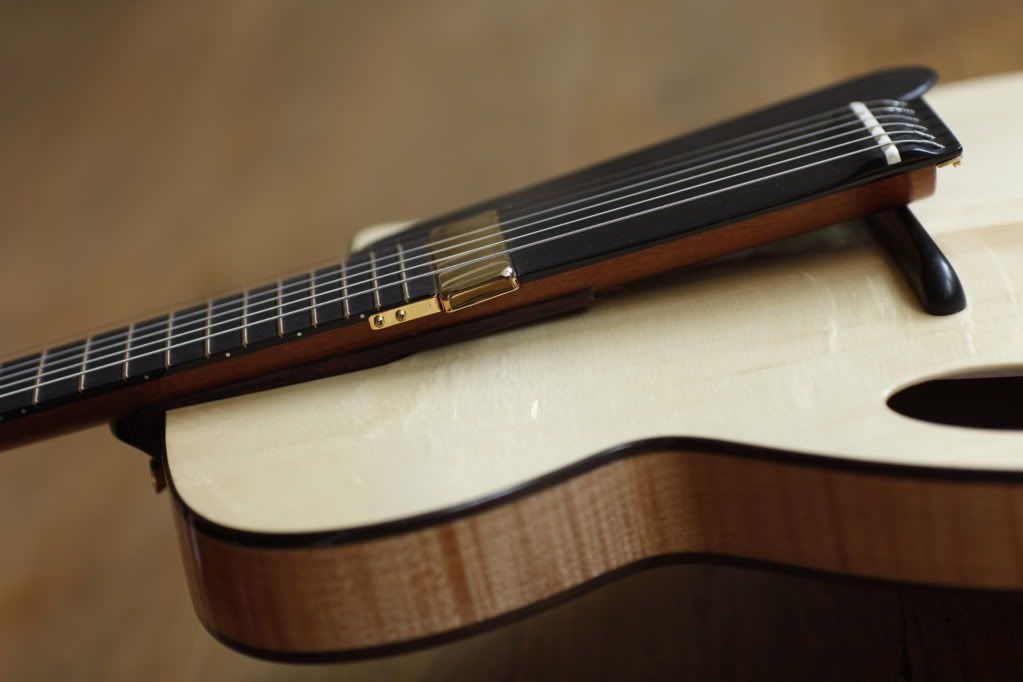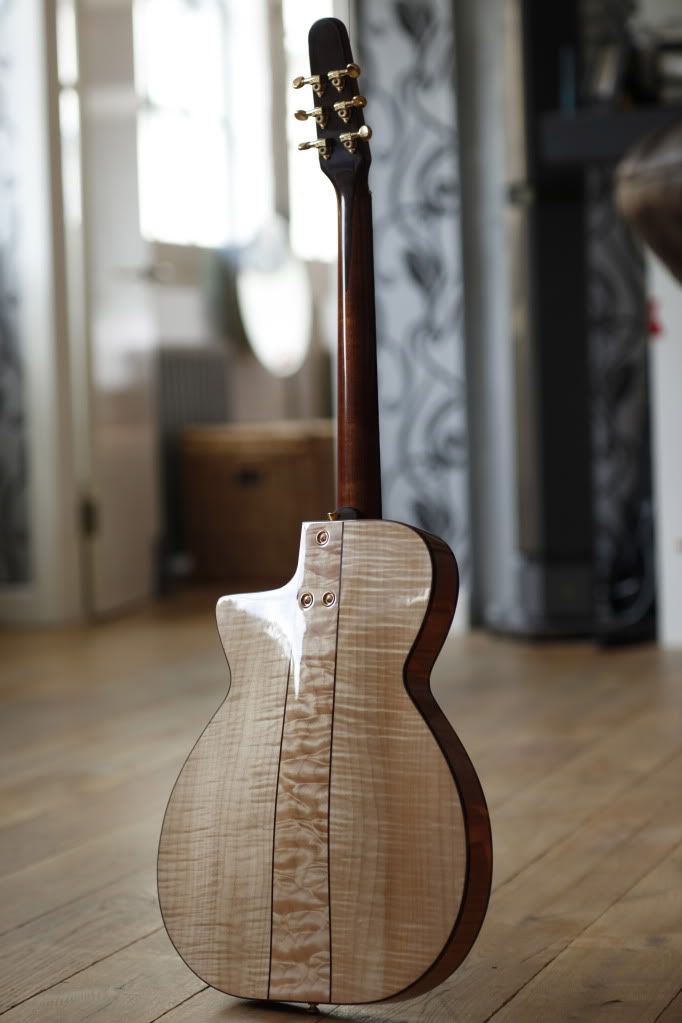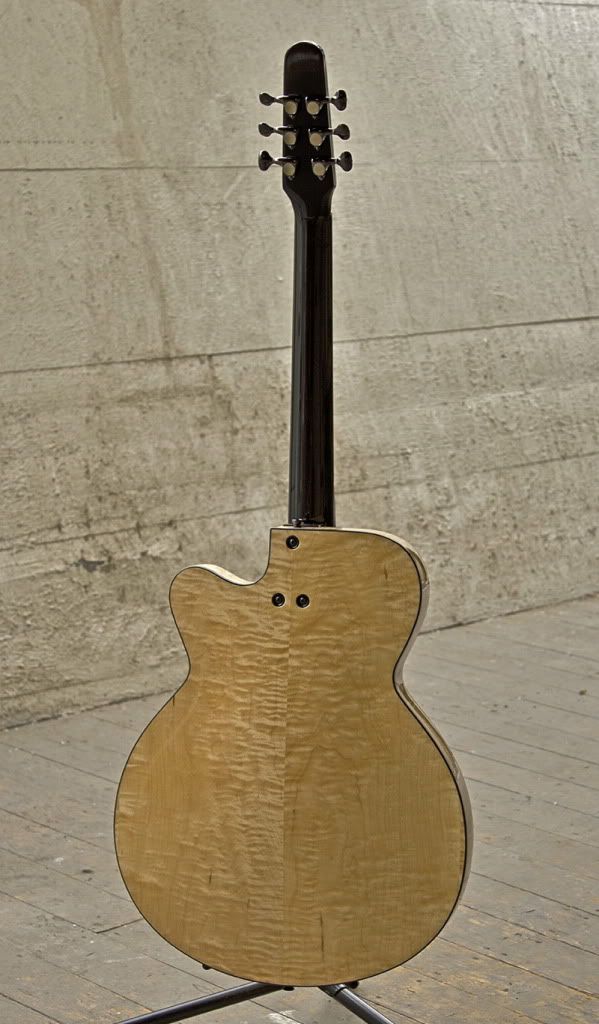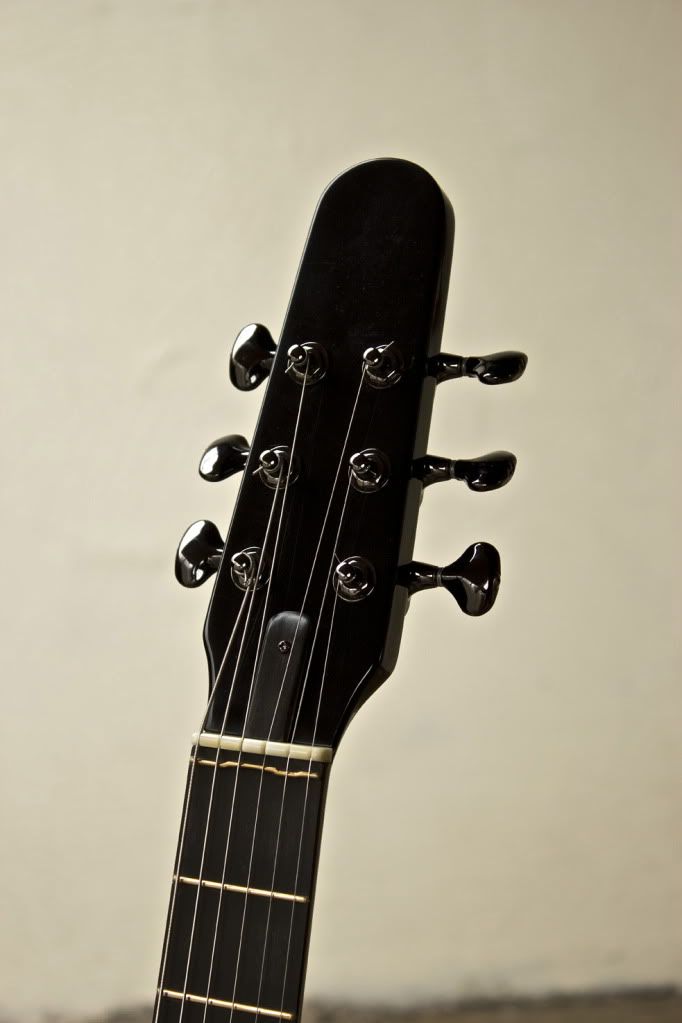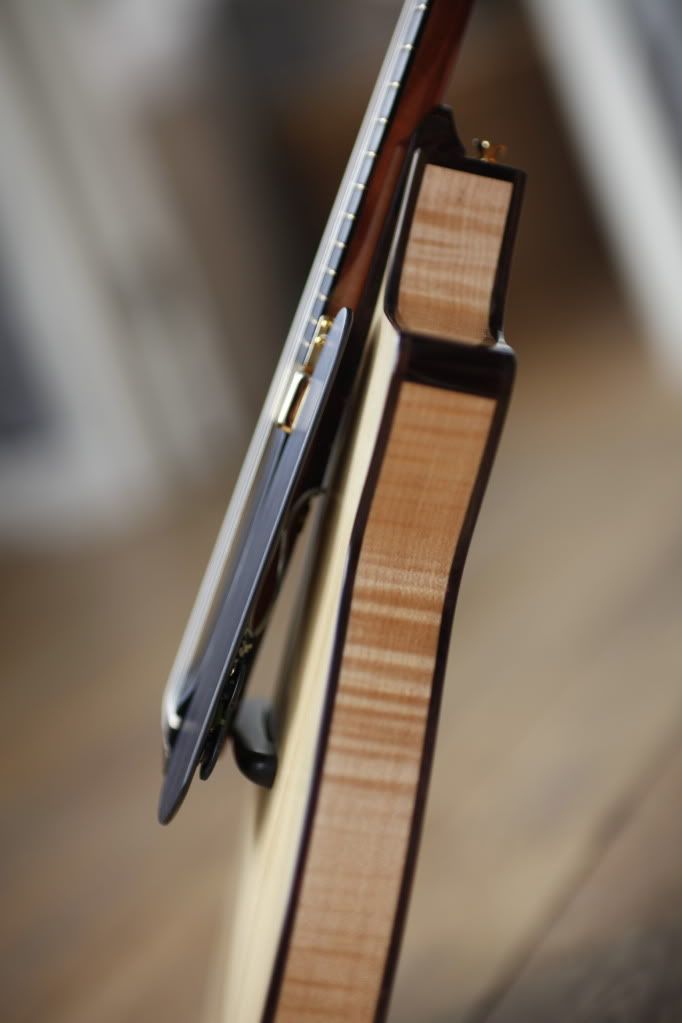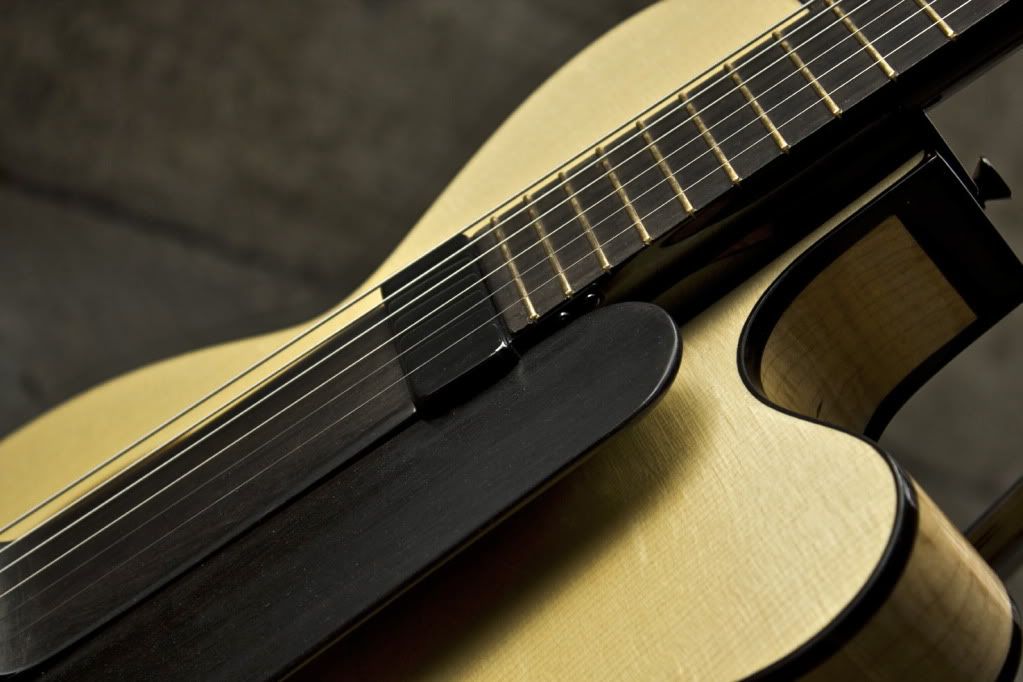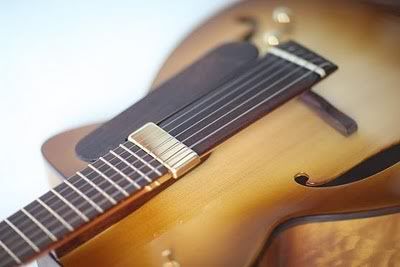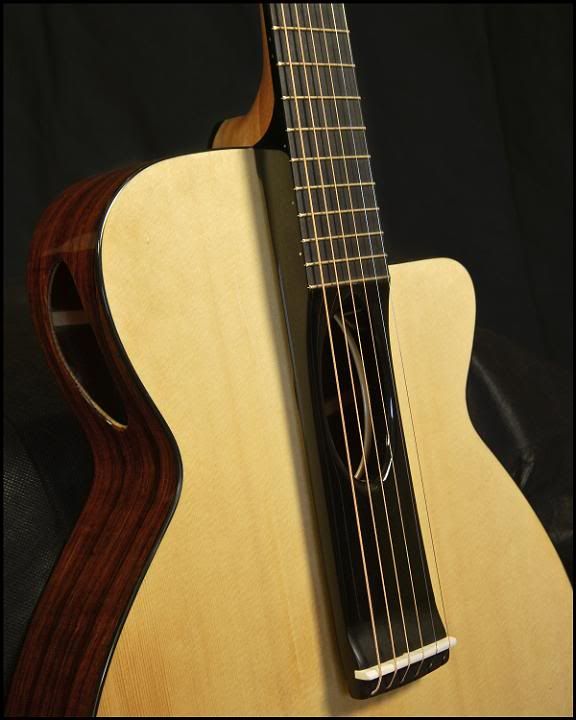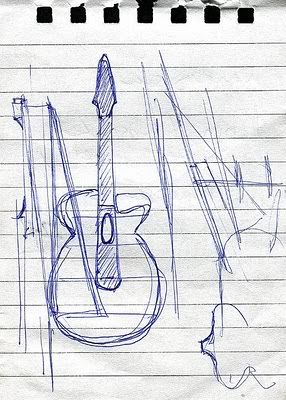Page 1 of 1
NK Forster archtops
Posted: Wed Oct 31, 2012 2:42 pm
by nkforster
Re: NK Forster archtops
Posted: Wed Oct 31, 2012 3:20 pm
by P Bill
Thanks for shareing the details Nigel. A very elegant design / solution. They sure sound nice.
Re: NK Forster archtops
Posted: Wed Oct 31, 2012 3:29 pm
by woodrat
Hi Nigel.....Lovely guitar!.....Is that a compensated zero fret I see there?
Regards
John
Re: NK Forster archtops
Posted: Wed Oct 31, 2012 5:13 pm
by Nick
Re: NK Forster archtops
Posted: Wed Oct 31, 2012 5:47 pm
by 68matts
Geez keep that up and you'll find yourself banned from here

Beautifully modern interpretations Nigel. Lovely work

Re: NK Forster archtops
Posted: Thu Nov 01, 2012 11:05 am
by Mark McLean
Yeah, Gobsmacked by the design flair and the execution.
Definitely want to know how you do the compensated zero fret please?
cheers (and cheering)
Mark
Re: NK Forster archtops
Posted: Thu Nov 01, 2012 1:00 pm
by Luke
Fantastic and inspiring ideas also the build quality wow.
Re: NK Forster archtops
Posted: Fri Nov 02, 2012 6:01 am
by Nick
Would you share how you did the compensated Zero fret Nigel or is that a Forster family secret passed down through twelve generations of skilled tradesmen?

Re: NK Forster archtops
Posted: Fri Nov 02, 2012 12:43 pm
by nkforster
Nick wrote:Would you share how you did the compensated Zero fret Nigel or is that a Forster family secret passed down through twelve generations of skilled tradesmen?

By reading Byers and Doolin. They've both written about how to work this out.
It's like this: set up your guitar as normal, get your tuner out (mine is a Peterson strobe) and make a map of where you're at for each string at each fret. By that I mean make a note of how many cents sharp or flat you are of equal temperament for each string at each fret. From that you can calculate whether your nut and saddle should be in relation to where they are now: on a 25.4" scale, one cent equals about 0.4mm (sorry to mix imperial and metric, I'm forever doing it) So you plan your new saddle and zero fret (or nut) accordingly adding or subtracting 0.4mm for every cent out. Then I make 'em and fit 'em and check 'em. If it's correct - and you can get extremely close to perfect equal temperament, then take notes for that scale, action and string as this is quite repeatable. Strings do vary of course, so it's worth doing again if you're changing gauge or type, but this is a very effective way to do this.
Changing the zero fret or nut in accordance to what is going on in the first few frets and changing the saddle to fit in with what is going on at say the 10th and up means you usually don't have to keep going back and forth. It works. Try it.
The fret itself: I start out with a wide stainless steel fret, flatten it to the correct height and to give me a broad top surface to work with, file the shape into it, then go through the grades and polish. Takes about an hour and works really well.
The hardest thing is to actually accept that equal temperament is what it is - perfectly out of tune! I've set guitars up like this so many times and still find myself tying to sweeten when tuning which is crazy - I understand the reason for equal temperament but my heart is just drawn to Just temperament...which is another story entirely....So, even when it's done all you have achieved is a compromise. But a good one.
Re: NK Forster archtops
Posted: Fri Nov 02, 2012 10:27 pm
by Kim
Great guitar Nigel, thanks very much for sharing her with us she's beautiful.
Cheers
Kim
Re: NK Forster archtops
Posted: Sat Nov 03, 2012 11:14 am
by christian
Again Wow!! beautiful work Nigel,
Cheers,
Christian.
Re: NK Forster archtops
Posted: Sun Nov 04, 2012 9:07 am
by Nick
nkforster wrote:
By reading Byers and Doolin. They've both written about how to work this out.
It's like this: set up your guitar as normal, get your tuner out (mine is a Peterson strobe) and make a map of where you're at for each string at each fret. By that I mean make a note of how many cents sharp or flat you are of equal temperament for each string at each fret. From that you can calculate whether your nut and saddle should be in relation to where they are now: on a 25.4" scale, one cent equals about 0.4mm (sorry to mix imperial and metric, I'm forever doing it) So you plan your new saddle and zero fret (or nut) accordingly adding or subtracting 0.4mm for every cent out. Then I make 'em and fit 'em and check 'em. If it's correct - and you can get extremely close to perfect equal temperament, then take notes for that scale, action and string as this is quite repeatable. Strings do vary of course, so it's worth doing again if you're changing gauge or type, but this is a very effective way to do this.
Changing the zero fret or nut in accordance to what is going on in the first few frets and changing the saddle to fit in with what is going on at say the 10th and up means you usually don't have to keep going back and forth. It works. Try it.
The fret itself: I start out with a wide stainless steel fret, flatten it to the correct height and to give me a broad top surface to work with, file the shape into it, then go through the grades and polish. Takes about an hour and works really well.
The hardest thing is to actually accept that equal temperament is what it is - perfectly out of tune! I've set guitars up like this so many times and still find myself tying to sweeten when tuning which is crazy - I understand the reason for equal temperament but my heart is just drawn to Just temperament...which is another story entirely....So, even when it's done all you have achieved is a compromise. But a good one.
Appreciate the info Nigel, thanks. Not sure when I'll next do a zero fretted build but all usefull tidbits for filing away

Re: NK Forster archtops
Posted: Sun Nov 04, 2012 1:57 pm
by H3ytm@n
nkforster wrote:Nick wrote:Would you share how you did the compensated Zero fret Nigel or is that a Forster family secret passed down through twelve generations of skilled tradesmen?

By reading Byers and Doolin. They've both written about how to work this out.
It's like this: set up your guitar as normal, get your tuner out (mine is a Peterson strobe) and make a map of where you're at for each string at each fret. By that I mean make a note of how many cents sharp or flat you are of equal temperament for each string at each fret. From that you can calculate whether your nut and saddle should be in relation to where they are now: on a 25.4" scale, one cent equals about 0.4mm (sorry to mix imperial and metric, I'm forever doing it) So you plan your new saddle and zero fret (or nut) accordingly adding or subtracting 0.4mm for every cent out. Then I make 'em and fit 'em and check 'em. If it's correct - and you can get extremely close to perfect equal temperament, then take notes for that scale, action and string as this is quite repeatable. Strings do vary of course, so it's worth doing again if you're changing gauge or type, but this is a very effective way to do this.
Changing the zero fret or nut in accordance to what is going on in the first few frets and changing the saddle to fit in with what is going on at say the 10th and up means you usually don't have to keep going back and forth. It works. Try it.
The fret itself: I start out with a wide stainless steel fret, flatten it to the correct height and to give me a broad top surface to work with, file the shape into it, then go through the grades and polish. Takes about an hour and works really well.
The hardest thing is to actually accept that equal temperament is what it is - perfectly out of tune! I've set guitars up like this so many times and still find myself tying to sweeten when tuning which is crazy - I understand the reason for equal temperament but my heart is just drawn to Just temperament...which is another story entirely....So, even when it's done all you have achieved is a compromise. But a good one.
Very informative Nick.
What happens when you retune the guitar to a non-standard tuning?
Beautiful guitar BTW, in so many ways.



Re: NK Forster archtops
Posted: Fri Nov 16, 2012 1:57 am
by nkforster
H3ytm@n wrote:nkforster wrote:Nick wrote:Would you share how you did the compensated Zero fret Nigel or is that a Forster family secret passed down through twelve generations of skilled tradesmen?

.
Very informative Nick.
What happens when you retune the guitar to a non-standard tuning?
Beautiful guitar BTW, in so many ways.



The guitar is compensated for equal temperament, but the tuning will have an effect. One of my customers always plays in DADGAD and so I compensated accordingly.
Re: NK Forster archtops
Posted: Wed Sep 18, 2013 11:19 am
by slowlearner
Hi Nigel, I'm resurrecting a thread from the dead. I'm wanting to build a similar 6 string bass. I'm interested in how you braced the top and back.

